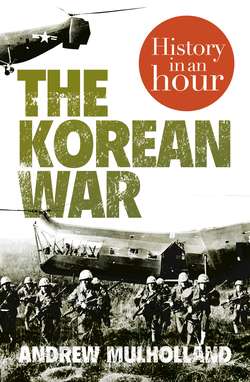Читать книгу The Korean War: History in an Hour - Andrew Mulholland - Страница 10
A United Nations War
ОглавлениеAt the international level, events moved very quickly following the North Korean attack of 25 June. That same day, the UN Security Council passed Resolution 82, condemning the North Korean onslaught. By the 27th, Resolution 83 had been passed, calling on all member states to provide military assistance to resist the invasion. Truman immediately ordered American air and naval assets into the theatre and that ground troops should be despatched as quickly as possible. Task Force Smith would be the first of these. Meanwhile, American diplomats set about assembling a coalition of nations willing to support this first real test of UN collective security.
The United Nations, a new organization, was keen to demonstrate the strength of its solidarity. It had been established in 1945 at the instigation of the Allied victors of the Second World War. Importantly, its architects were anxious to avoid the perceived weaknesses of the League of Nations, its forerunner. With far fewer members than today (and most broadly supportive of what might be termed an ‘American-led agenda’) there was the strong sense that the United Nations must not be allowed to fail. The catastrophe of the Second World War was fresh in people’s minds. It was felt that had Hitler been challenged earlier, rather than appeased by the League, then much of the suffering could have been avoided. Attitudes to collective security in the face of breaches of international order were a lot more robust than tends to be the case today.
The senior body responsible for global security at the United Nations was the Security Council. Permanent membership included what at the time were still known as the five ‘great powers’ (Britain, France, the USA, Russia and China), each of whom had a veto. The chairmanship rotated, as did the membership of other states. There were ten of these, elected on a regional basis and without veto rights. The Security Council, therefore, had a total of fifteen members, five of them permanent. UN Security Council resolutions were supposed to be mandatory, unlike those of the larger General Assembly, which included all UN member states. In practice, the veto system meant that it was very difficult for the Security Council to take controversial decisions – or, indeed, to reverse them.
In terms of technical process, Russia had boycotted the Security Council. She was not represented at these crucial meetings and, therefore, had no opportunity to veto the proposed resolutions. The reason for the boycott was a dispute about the Security Council’s refusal to officially recognize Mao’s Communist regime in China. Nationalist China, now no more than a mini-state located on the island of Taiwan, continued to hold China’s seat. With some justification, the Russians maintained that the seat should be given to Mao’s Communist regime, as the real government – benign or not – of almost all of modern China. In terms of realpolitik it is hard to exaggerate the blunder that this stance represented for Russia. Had they been present, presumably they would have vetoed the motions and the Korean War might have taken a very different course.
There are those who argue that this is evidence of Russia’s innocence in the matter of the Korean War. The same argument has it that she made a fuss about China in order to strengthen Mao’s dependence on Moscow. Whatever the case may be, Russia was back on the Security Council by August – this time in the chair. For the remainder of the conflict the Council became deadlocked (in the manner that has become increasingly familiar since). This would also mean that Russia could not reverse what was now established Security Council policy: this was to be a UN war.
